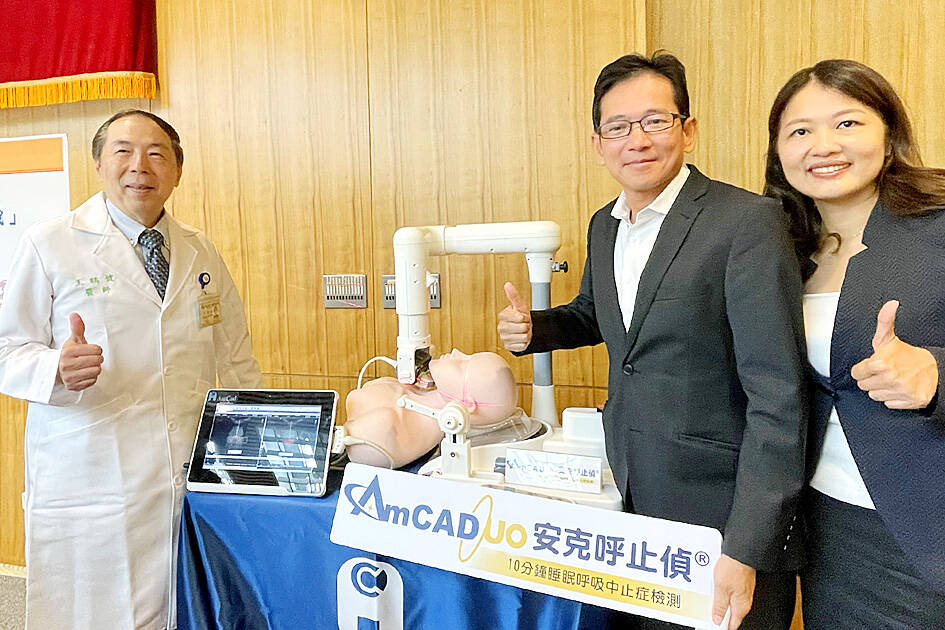National Taiwan University Hospital (NTUH) has developed an ultrasound device that uses artificial intelligence (AI) to assess in about 15 minutes a person’s risk of sleep apnea, as many people are not diagnosed due to the difficulty of undergoing a polysomnography, it said yesterday.
NTUH Health Management Center director Chiu Han-mo (邱瀚模) said that a US study found that about one in five people in the US have sleep apnea, one in 15 have severe sleep apnea and one in four middle-aged men have sleep apnea, but about 75 percent of those with severe sleep apnea are undiagnosed and untreated.
Untreated sleep apnea can increase the risk of heart disease, diabetes, stroke, memory loss, depression and other chronic diseases, he said, adding that people with severe sleep apnea are at more than double the risk of death and being involved in traffic incidents, and 1.5 times more likely to develop hypertension.

Photo: Chiu Chih-jou, Taipei Times
NTUH Health Management Center attending physician Tseng Ping-hui (曾屏輝) said that sleep apnea is underdiagnosed, as many people are not aware that their sleep is being interrupted.
If they suspect it, they should arrange for a 24-hour polysomnography to be diagnosed, which many find inconvenient, as they are often required to wait for a long time to be scheduled for the sleep study, Tseng said.
With at-home sleep apnea tests and other new methods being developed in the past few years, NTUH and a local biomedical company developed an AI-assisted ultrasound scan device to assess the risk of sleep apnea in about 10 to 15 minutes, he said.
NTUH said the device was developed by National Taiwan University professors Wang Hao-chien (王鶴健) and Argon Chen (陳正剛).
A clinical trial was conducted at the Stanford Sleep Medicine Center in California and the NTUH Health Management Center for the device, which has been approved by the Food and Drug Administration (FDA) and the US FDA, and received the EU’s CE marking certification, it added.
Tseng said that people who receive the AI-assisted ultrasound scan do not have to be asleep.
They only need to breathe several times as instructed and the device can assess their risk of obstructive sleep apnea in about 10 to 15 minutes, he said.
Of the more than 1,100 people who received the test at NTUH, 28 percent (108 people) were determined to be at high risk of sleep apnea and referred to the Center of Sleep Disorder for a through polysomnography, he said.
Of those referred for the sleep study, 103 were diagnosed with sleep apnea, an accuracy rate of about 95 percent, he said.
NTUH Center of Sleep Disorder director Hsu Wei-chung (許巍鐘) said that obstructive sleep apnea was previously thought to be more common in elderly people, those who are overweight or obese, and those who have a short neck, but clinical data collected from the ultrasound scan show that many people diagnosed with sleep apnea are not obese or elderly.
Most are in their 40s, Hsu said.

Weather conditions across Taiwan are expected to remain stable today, but cloudy to rainy skies are expected from tomorrow onward due to increasing moisture in the atmosphere, according to the Central Weather Administration (CWA). Daytime highs today are expected to hit 25-27°C in western Taiwan and 22-24°C in the eastern counties of Yilan, Hualien, and Taitung, data on the CWA website indicated. After sunset, temperatures could drop to 16-17°C in most parts of Taiwan. For tomorrow, precipitation is likely in northern Taiwan as a cloud system moves in from China. Daytime temperatures are expected to hover around 25°C, the CWA said. Starting Monday, areas

A Taiwanese software developer has created a generative artificial intelligence (AI) model to help people use AI without exposing sensitive data, project head Huang Chung-hsiao (黃崇校) said yesterday. Huang, a 55-year-old coder leading a US-based team, said that concerns over data privacy and security in popular generative AIs such as ChatGPT and DeepSeek motivated him to develop a personal AI assistant named “Mei.” One of the biggest security flaws with cloud-based algorithms is that users are required to hand over personal information to access the service, giving developers the opportunity to mine user data, he said. For this reason, many government agencies and

The National Fire Agency on Thursday said a series of drills simulating a magnitude 8.5 earthquake would be held in September to enhance the government’s emergency response capabilities. Since earthquakes cannot be predicted, only by continuously promoting disaster prevention measures could Taiwan enhance its resilience to earthquakes, agency Director-General Hsiao Huan-chang (蕭煥章) said in a news release. The exercises would be held to mark annual National Disaster Prevention Day on Sept. 21, the aim of which is to test Taiwan’s preparedness and improve its earthquake resilience in case of a major temblor, Hsiao said. As part of those drills, an earthquake alert would

STRICTER ENFORCEMENT: Taipei authorities warned against drunk cycling after a sharp rise in riding under the influence, urging greater public awareness of its illegality Taipei authorities have issued a public warning urging people not to ride bicycles after consuming alcohol, following a sharp rise in riding under the influence (DUI) cases involving bicycles. Five hundred and seven people were charged with DUI last year while riding YouBikes, personal bicycles, or other self-propelled two-wheelers — a fourfold increase from the previous year, data released by the Taipei Police Department’s Traffic Division showed. Of these, 33 cases were considered severe enough to be prosecuted under “offenses against public safety,” the data showed. Under the Road Traffic Management and Penalty Act (道路交通管理處罰條例), bicycles — including YouBikes and other